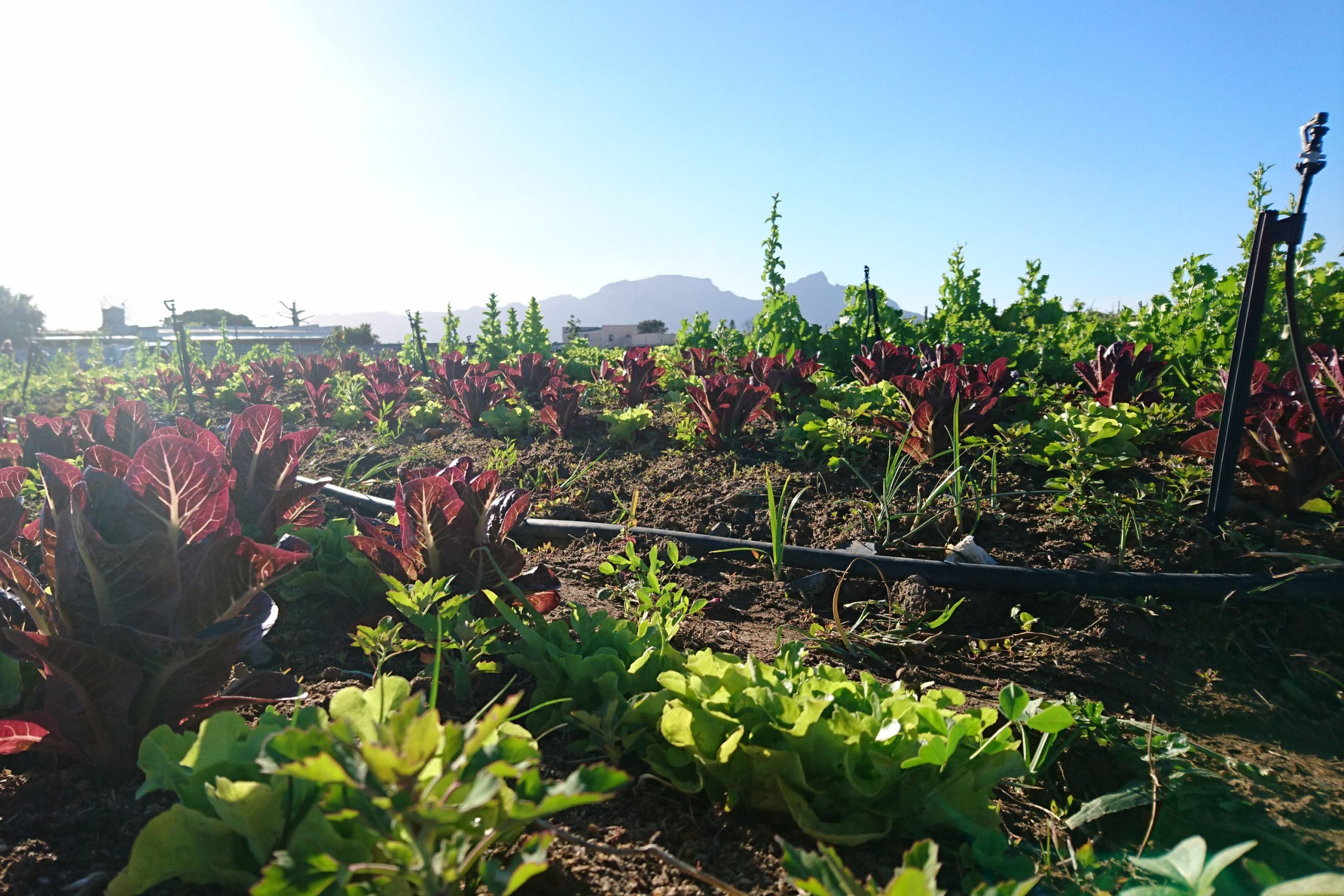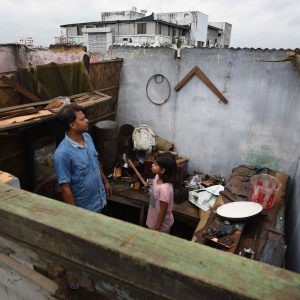Soil and land in the Philippi Horticultural Area
The struggle to preserve this resource for residents of the Cape Flats to farm and feed themselves is about protecting it from development and nurturing the richness it offers.
Author:
14 October 2020

The global climate crisis has posed several warnings that the planet is in trouble. The productivist logic of capitalism, in its drive to commodify and exploit nature, has entrenched the idea that humans are separate from and above nature. This idea has permeated every facet of modern society by upholding “development” – and the economic growth it signifies – as the pinnacle of success, often at the expense of ecological well-being. Yet in the shadow of immense crises, we are also witnessing a sharp rise in global and local movements collaborating, caring and generously giving in service to the lives of others, outside the self-interest of the capitalist system.
In the depths of the Covid-19 lockdown in April, the Philippi Horticultural Area (PHA) Food & Farming Campaign’s Family Foodbasket drive provided food parcels to over 9 000 of Cape Town’s most vulnerable people. A large amount of the donated food was sourced locally from the PHA. The efforts were organised by committed volunteers and embodied a sense of commoning and care for the collective wellbeing of all. The recipients were farm workers, their families and their communities. The lockdown revealed the deepening inequality of food production in the capitalist system, where those who grow our food are hungry.
Related article:
Within the Philippi Horticultural Area, the PHA campaign has spent the last 11 years appealing to different government bodies to protect the horticultural area from being rezoned for developments including a prison, private school and middle-income housing. Its many legal battles – to defend more than one-third of its area – have called for the protection not only of this farming area as an agricultural zone, but for the protection of its vast underground water aquifer and agro-ecological farming. Agriculture here provides both local employment and further bolsters the PHA as a site for a diverse sustainable economy.
However, the PHA campaign extends well beyond saving the aquifer and the land for agriculture. Its vision centres on an alternative relationship to the land through a reconnection with and consequent renewal of the soil of the PHA itself. Regenerative farming methods, where the soil is fed just as essentially as the soil feeds us, allows soil to serve as a carbon sink, reducing atmospheric carbon dioxide. The land and soil of the PHA needs to be understood not simply as a natural resource to be extracted for glass mining, or “developed” into another urban development, but as a site of struggle with profound meaning and relational connectivity. In this time of crisis, the soil metabolism of the PHA is a crucial hub for the relocalisation of food cultivation and metabolic rebalance between the needs of both humans and nature.
Soil memory
The concept of soil memory has been used by climate scientists to refer to the way that soil holds information of past climates and the rate of climate change. However, the term soil memory could also be expanded to encompass a deeper understanding of the social-ecological history of the soil. Robin Kimmerer, in her 2013 book Braiding Sweetgrass: Indigenous Wisdom, Scientific Knowledge and the Teachings of Plants, reminds us that restoring and healing our relationship with the earth and the way we have used, abused and profited from land is not possible without a process of hearing and understanding the memories of the land.
Retelling the story of the PHA from the perspective of the land and soil as a living archive of ecological memory, resistance and renewal can perhaps encourage a rethinking of the current situation in the area. It can potentially push the conversation beyond transactional and commodified approaches underpinned by a capitalist logic. This re-storying can help shift understandings of the land beyond a commodity to one that restores multiple knowledges and world meanings. It can help us restore both the relationship between humans and non-humans and our place in the planetary metabolism.
Related article:
Located on the Cape Flats, the 3 000ha PHA farmlands now surrounded by urban development is what remains of a vast expanse of land that the Khoekhoe, as nomadic pastoralists, moved through with their cattle for suitable grazing. The Khoekhoe and the San peoples lived a nomadic way of life allowing for seasonal migration in order to forage for food and herbs as well as allow their cattle to graze sustainably.
The soil in this area holds carries the consequences of the colonisation of the land, and the racist laws that followed. Under these laws the only way the Khoekhoe and San people could regain access to land was to be forced into farm labour or mission stations. However in the 1980’s after living and working the land for decades, they faced forced removals. Today, many of these people live in shack settlements within the area of the PHA.
Reciprocal nurturing
The PHA campaign revives the relational connection to the soil by cultivating food using a method inspired by the Waterman’s farming philosophy, which dates back to the Camissa people of Khoekhoe kin groups who lived alongside streams on the mountains of Cape Town. The Waterman’s philosophy relates to soil in the memory that it holds, the wisdom it produces and the life it sustains. The quality of relations with all life – human and non-human beings – is valued to coexist in reciprocal ways and ensure the reproduction of all life. By cultivating relationality with the land, the PHA campaign acknowledges both this history that the soil holds as well as the role the ancestors have in restoring our relationship to each other and nature.
Viewing the soil as a living archive of memory accordingly also works to resist centuries of colonial epistemicide that sees the soil as a resource to be plundered for capital accumulation. The current ill health of the soil reflects economic profit being prioritised above social and ecological wellbeing. The unhealthy, damaged soil with its flooding, water runoff and cause of diseases embodies its continuing resistance to extractive development.
Related article:
The soil is thus a site of struggle and resistance to the kind of agriculture that competes with nature, based on monoculture reductionist thinking that has for centuries damaged the soil.
The Waterman’s understanding of soil thus illuminates past relations with the land that prioritises renewal through restoring the dignity of nature and the soil’s integrity. The soil of the PHA farmlands can then also be seen as a site of renewal through a new understanding of and reconnecting with the soil as a composite of life. It can assist us to realise that when we cultivate food, we are not only feeding ourselves but also the microbes, insects, earthworms – all life necessary for healthy, diverse soil needed for nutritious food. The soil, through the Waterman’s understanding, is a nexus of reciprocity and mutual exchange. Our bodies interact biologically with how the food we eat is grown. By providing ecosystems and habitats for diversity and life to thrive, the soil is directly related to our gut health.
Housing alternatives
In the process of renewal, it will be important to set intentions to act responsibly and ecologically in ways that ensure restorative and redistributive justice. The eastern border of the PHA farmlands is a separate area of about 200ha referred to as “The Wedge”. This portion is a suitable height above the water table for housing purposes. The PHA campaign has accordingly proposed that The Wedge, together with various public land in and around the city (10 000ha of which have been identified by the City of Cape Town), would be more suitable for housing.
It has also suggested that, instead of the government’s concrete “matchbox” housing, an alternative socio-ecological housing plan that focuses on restoring the wetland and reviving the soil’s integrity would contribute hugely to restoring human-nature relationships and wellbeing. This creative conceptualisation of housing offers a more relational way of living by protecting and honouring the soil that sustains all life and re-establishes a way of living reciprocally with the soil that has been lost over centuries of labour tenant evictions, forced removals and colonial land grabbing.
Related article:
The Covid-19 pandemic has reminded us of just how vulnerable we are in the wake of our current global ecological crisis. By reviving soil memory, the PHA campaign contributes to reviving the memory of human and non-human entanglement with land and soil. Furthermore, the campaign recognises the deeply traumatic history of its dispossession as well as its continuing destruction for capital accumulation, and the need to acknowledge this in future. The soil itself reminds us of the myriad ways in which it has resisted its alienation, making it an important site of struggle and resistance to extractive use and development.
The soil teaches us that if we reconnect with it, we can cultivate food locally, plentifully and in regenerative ways. This offers a way of thinking beyond a dependence on dualistic, techno-scientific solutions to the many crises facing humanity. The soil reminds us of the need to shift to collaborate with the intelligence of the earth’s metabolism not only for our own wellbeing, but for the continued existence of all life forms on earth.
The authors are affiliated with the University of Cape Town and work with the PHA Food & Farming Campaign.




